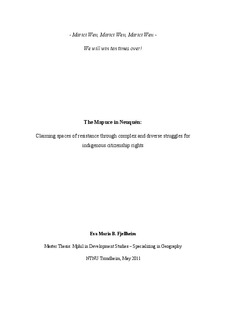- Marici Weu, Marici Weu, Marici Weu - We will win ten times over!: The Mapuce in Neuquén: Claiming spaces of resistance through complex and diverse struggles for indigenous citizenship rights
Master thesis
Permanent lenke
http://hdl.handle.net/11250/265447Utgivelsesdato
2011Metadata
Vis full innførselSamlinger
- Institutt for geografi [1119]
Sammendrag
The broader context of this study constitutes the continuous pressure and strain the dominant society often put on the culture, livelihood and self-determination of indigenous peoples, but also on the increased international recognition and formalisation of indigenous rights emerging the last few decades. The Mapuce reality is no exception. This thesis focuses on the Mapuce right-claimers as possible change makers in a context of many constraints through exploring different processes of claiming spaces of resistance in a quest for realising indigenous citizenship rights. More specifically, this thesis aims to explore the challenges, strategies of resistance and possibilities for change in the course of a diverse and complex struggle for rights.
The research is based on a two and a half month qualitative fieldwork in Neuquén, Argentina from June to August 2010. During this period, I established a close relationship with many of the research participants conducting in-depth interviews, innumerable informal conversations and participant observation. Based on the information acquired, I found that one of the most profound challenges facing the Mapuce is the discriminative social structure on which the Argentine state has been established. A lack of will prevents real implementation of the rights concerning indigenous peoples recognised in federal and provincial constitutions. The study furthermore shows that despite of these obstacles, the Mapuce right-claimers have found ways to wiggle around them. In the absence of effective participation in invited spaces, they practise a variety of strategies in order to claim their own spaces of resistance. Recuperation of land and large demonstration constitute parts of this political engagement, but more longterm strategies such as organisation, collaboration and capacity building is the crucial foundation on which their struggle depends. By combining individual and generational knowledgeabilities, in addition to drawing on those of others, I suggest that the Mapuce position themselves better in terms of their possibilities for acquiring change.
